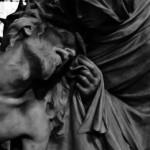We run our website the way we wished the whole internet worked: we provide high quality original content with no ads. We are funded solely by your direct support. Please consider supporting this project.

God’s “Ways” and “Thoughts” are Higher
Isaiah 55:8-9 is one of the more often quoted passages in the Bible. It reads:
… my thoughts are not your thoughts,
neither are your ways my ways …
As the heavens are higher than the earth,
so are my ways higher than your ways
and my thoughts than your thoughts (vss. 8-9).
This passage is frequently cited as an expression of God’s “wholly other” transcendence, sometimes even being invoked to protect incoherent theological positions from reasonable objections. However, is this what God’s “ways” and “thoughts” are referring to here?
If we read from verse one in this chapter, we see that verses 8-9 actually conclude a larger section where the Lord confronts the nationalistic myopia of his people by announcing that anyone from any nation who is thirsty or hungry can come and feast at his banquet table for free (vss. 1-2). He promised all who come to his feast that he will bring them into the “everlasting covenant” that he “promised to David” (vs. 3). For, the Lord says, David was raised up not just to be the earthly king of the Jews but also to be a “witness” and “ruler” of all nations (vs. 4). If Israel was God’s chosen nation, we see, it was only to be used to help all nations realize that they too are “chosen.”
The Lord reiterates this point further when he goes on to proclaim to his nationalistic-minded people that they will someday “summon nations you know not, and nations you do not know will come running to you” because the Lord “has endowed you with splendor” (vs. 5). Only then can we see what is really going on when the Lord proclaims the nature of his “ways” and “thoughts.”
Yahweh is here confronting the myopic, nationalistic mindset of his people. His ways are “higher” than theirs precisely because, while Israel always had a tendency to think Yahweh somehow belonged uniquely to them, everything Yahweh was doing in and through them was in fact being done with a view of reuniting and blessing all humans by bringing them under his loving reign.
Image by Samuel Zeller.
Category: General
Tags: Covenant, God, Israel, Nationalism, Transcendence
Topics: God
Verse: Isaiah 55
Related Reading

A Revelation of Beauty Through Ugliness
In my recent post, Getting Honest About the Dark Side of the Bible, I enlisted no less an authority than John Calvin to support my claim that we need to be forthright in acknowledging that some of the portraits of God in the OT are, as he said, “savage” and “barbaric.” What else can we…

A Foolish and Weak-Looking God
The New Testament assumes that the God of Israel and the God revealed in Jesus Christ are one and the same God. But there also can be no question that the portrait of God that was unveiled when the Messiah arrived on the scene was in some respects quite different from what the OT had…

The Cruciform Center Part 1: How Matthew, Mark and Luke Reveal a Cruciform God
In the previous series of posts I’ve argued that a merely “Christocentric” approach to God is too general, as can be shown by the widely different conceptions of God people arrive at, despite their claim to be “Christocentric.” The confession that Jesus reveals what God is like is simply too abstract, for it leaves too…

Greg Uncovers Flaws in Aquinas, and It Could Change Everything
In this episode Greg shares some intriguing insights about Aquinas and Aquinas’ concept of God.

The God Who Embraces Our Doubt
Lawrence OP via Compfight Zack Hunt over at The American Jesus posted some of his thoughts on doubt, and it seemed fitting on this week before the Doubt, Faith & the Idol of Certainty conference to share what he had to say. We’re thinking he must have stumbled on Greg’s book or maybe God is…

Jesus’ Different Kind of Nation
God called Abraham to form a unique nation by which “all peoples of the earth will be blessed.” The unique call of the descendants of Abraham was to become a nation of servant-priests whom God would use to reunite the nations of the world under his loving Lordship. The vision of a reunited humanity is…
